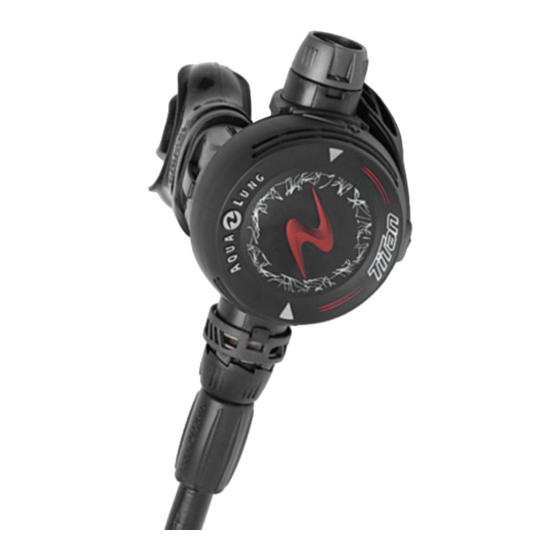Aqua Lung Octopus Wartungshandbuch - Seite 6
Blättern Sie online oder laden Sie pdf Wartungshandbuch für Controller Aqua Lung Octopus herunter. Aqua Lung Octopus 20 Seiten. Second stage
Auch für Aqua Lung Octopus: Technisches Bulletin (4 seiten)

6
NOTE:
Because the crown is o-ring sealed, it will not
freely exit the valve body after it has been disengaged.
The following step must be performed correctly in order to
remove the crown without damaging its delicate sealing
surface.
13.
When the crown (14) has been unthreaded from the inlet
fitting (13), carefully insert the pin of the extraction tool (P/N
109437) into the opposite end of the inlet fitting and through
the center of the crown. Gently press the crown out onto a
padded surface (see Fig. 1). Remove and discard the crown
o-ring (15).
14.
Closely examine the crown (14) with the use of magni-
fier to check for any scoring, nicks, or other damage to the
polished sealing surface. If damage is found, discard the
crown, and do not attempt to reuse. If it is in reusable condi-
tion, set it aside on a soft surface to prevent damage to the
sealing edge.
15.
Press the valve body (19)
with lever assembly into
the box bottom (4) by
inserting a finger through
the inlet opening. Gently
lift the assembly out of the
box bottom, being careful
to avoid pulling or tugging
on the lever (18).
WARNING:
The components that make up the
valve subassembly are under spring tension. Dis-
assemble according to instructions found in the
next step. Failure to wear proper eye protection
could result in an eye injury should the compo-
nents (16-23) eject out of the valve body (19).
16.
Stand the valve assembly vertical on the head of the poppet
(22), with the lever (18) facing up, and depress the valve
body (19) to expose the locknut (16). While holding the
valve body fully depressed, apply a 1/4" nut driver to turn
the locknut counter-clockwise until it has disengaged from
the threads of the poppet. Remove the locknut, washer
(17), and lever, and slowly relax the valve body (19) to lift it
off the poppet and spring (21). Discard the locknut, and do
not attempt to reuse.
17.
Closely inspect the shape and condition of the lever (18) to
ensure it is not bent, corroded, or otherwise damaged. If
any signs of damage or corrosion are found, discard the
lever and do not reuse.
18.
Closely examine the poppet spring (21) with a magnifier to
ensure it is not damaged (bent) or corroded. If any signs of
damage or corrosion are found, discard the spring and do
not reuse.
19.
Using a needle or sharp
pick, stick the center of
the LP seat (23) inside the
head of the poppet (22)
and lift the seat out, being
very careful to avoid dam-
aging the poppet. Set the
seat aside to be used as
an aid during reassembly,
and inspect the head of
the poppet to check for any nicks, scratches, or other signs
of damage. The through-hole beneath the LP seat cavity
should be clear and free of any obstructions. If any signs of
damage are found, discard the poppet and do not attempt
to reuse.
NOTE:
The used LP seat is an essential aid to the reas-
sembly procedure for the valve body. Do not discard the
seat until the reassembly and final adjustment procedures
have both been performed, and the regulator is functioning
satisfactorily.
